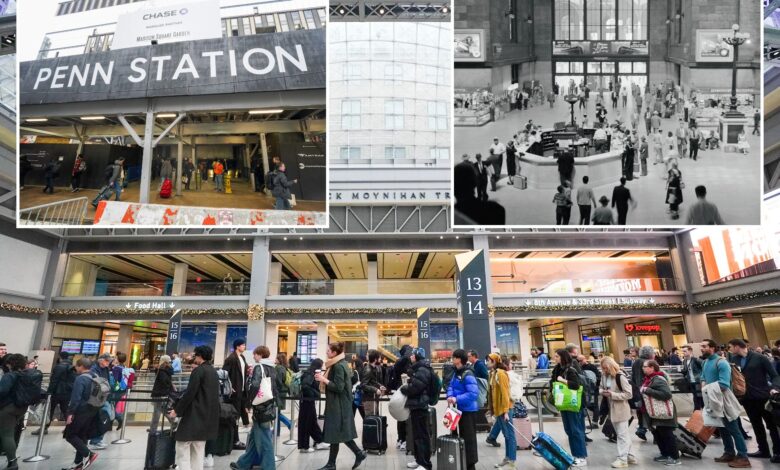It’s time to leave Penn Station alone

This might make me the most ridiculed man in New York City.
I’m here to celebrate Penn Station — not the original one demolished in the 1960s, and not futuristic “visions” that won’t ever be built.
I mean the one that exists today in all its supposedly ugly, overcrowded and dysfunctional state.
It’s almost perverse for a New Yorker to say he or she doesn’t hate Penn Station.
So ingrained in our local psyche is the perception of it as a labyrinth of squalor, saying that one likes it is tantamount to expressing glee that the Dodgers and Giants moved to California.
But I’ll take the heat for arguing that the sprawling, underground complex, which now stretches from Seventh to Ninth Avenue, is much, much better for catching trains or passing through than it was even a dozen years ago, and parts of it are absolute joys.
Penn Station is not, and never will be, a West Side version of Grand Central Terminal.
But we don’t need to dig up a dozen city blocks and tear down a bunch of buildings to make way for a whole new Penn Station, as Gov. Hochul says she desires.
We don’t need to move Madison Square Garden, which sits on top of it — a pipedream of Dolan family-hating politicians, the Municipal Art Society, the Regional Plan Association and architects by the score.
They hope to evoke the grandeur, if not to replicate, the great masterpiece that was the original Penn Station, taken from us 60 years ago.
Over the past 10 years, improvements both monumental (Moynihan Train Hall) and incremental (lots of new and improved street entrances) by Vornado Realty Trust, the MTA, Amtrak, the LIRR and New Jersey Transit have made the sprawling complex more attractive and navigable than it’s ever been.
Architectural historian Vincent Scully famously, and accurately, wrote of the original station’s replacement with a cheap and graceless underground warren: “One entered the city like a god; one scuttles in now like a rat.”
Neither heavenly beings nor vermin are evident these days.
What you will find, now that major construction is finished, is that recent alterations and additions — admittedly often imperfect, piecemeal and uncoordinated — eliminated many of the evils that made the place hell for subway riders, commuters and long-distance travelers alike.
Vornado deserves much credit.
It led a public-private partnership to create the $1.6 billion Moynihan Train Hall.
The real estate giant partnered with the MTA to expand the LIRR Concourse’s main passageway and raised oppressively low ceilings to 18 feet in height.
Vornado also teamed up with Amtrak to rebuild and enhance the station’s busiest entrance at West 32nd Street and Seventh Avenue — one of several new gateways into the station that previously seemed to hide underground as if ashamed of its existence.
The developer’s motives weren’t entirely altruistic.
It wanted to make Penn Station a lynchpin of its larger plan to create a new “PENN District” around it, which it has already achieved with the redesign and modernization of office towers attached to the station.
But the result has proven a boon to everyone who passes through.
A stroll underground between Seventh and Ninth avenues reveals a complex that, if not entirely new, at least looks new.
It’s creditably clean for a place through which 600,000 pass daily.
Public toilets, once scarce and creepy, are now plentiful and relatively safe.
Uniformed police and anti-terrorism troops are numerous and visible. In many recent treks through the complex, I didn’t see any of the hustlers, beggars and drug addicts who congregate on nearby surface streets.
This is partly due to the lack of seats, especially in Moynihan Hall.
But those who grumble about it should know that the original station’s vast waiting room had no seats either.
The LIRR concourse is wider and better-lit. Vornado replaced some of the city’s worst fast food outlets with the likes of Shake Shack and Chick-fil-A.
Making one’s way between the areas for Amtrak, New Jersey Transit, subways and the skylit Moynihan Train hall is almost a snap since plywood barriers came down.
And the Moynihan Food Hall is a thing of wonder.
Sure, the cramped New Jersey Transit waiting room remains a daily ordeal for suburbs-bound riders who don’t know what track their train will arrive on until it’s too late to avoid a stampede.
The Amtrak ticket area needs upgrading as well. But overall the station functions well enough.
Many who lobby for a “new” Penn Station as magnificent as the original are too young to have seen or experienced it. But it was a part of my life for years. I can tell you that any effort to revive its spirit, if not to replicate it, is doomed to fail.
For one thing, few of the materials or the labor skills that went into building the McKim, Mead and White architectural masterpiece exist today.
As refreshing an addition as the Moynihan Train Hall is, its steel-and-glass canopy reminds us that a pastiche of the original station’s soaring concourse can only fall short.
But until science finds a way to revive the past “Star Trek”-style, let’s all calm down about a “new” Penn Station and appreciate the one we’ve got.
scuozzo@nypost.com




